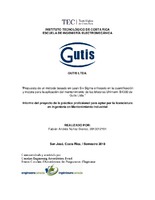Propuesta de un método basado en Lean Six Sigma enfocado en la cuantificación y mejora para la aplicación del mantenimiento de las blisteras Uhlmann B1330 de Gutis Ltda.
Abstract
Every maintenance department’s main objective is to guarantee achieving
the organization’s goals. A good maintenance management not only offers the
assets’ longest life possible, but also needs the required feedback to achieve and
maintain the continuous improvement for the productive performance.
Lean Six Sigma is a method for continuous process improvement and is
based in the DMAIC strategy. It defines the problem, measures the variables that
quantify the current performance, analyzes the causes of the problem, improves
the aspects that can lessen the problem, and controls the improvements with the
performance indicators previously measured.
This model can be used to obtain a tool that generates value from the
performance indicators (KPI). These numerical values do not provide solutions for
themselves, they are the inputs for a methodology that achieves the results.
This project tries to show that a quantitative analysis can be the first step to
obtain improvements in a maintenance department management. For this
research’s purposes, a Lean Six Sigma methodology is presented and developed
in the Uhlmann B1330 blister for the Gutis company.
The development of the project proves how the indicators support that
apparent causes are not always the real causes. This evidences that an analysis is
also needed to obtain the results. Therefore, this project’s solutions change from
being focused on maintenance plans, and instead, now they focus on improving
the maintenance management in SAP.
This software is the environment where all the company’s logistics are
managed. SAP has some problems with its implementation for the maintenance
department. This project tries to solve them and provide an instrument to measure
the performance of corporation’s maintenance.
Description
Proyecto de Graduación (Licenciatura en Mantenimiento Industrial) Instituto Tecnológico de Costa Rica, Escuela de Ingeniería Electromecánica, 2018.


